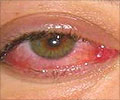The stomach ulcer bacterium Helicobacter pylori is not transmitted through drinking water as previously thought, but rather through vomit and possibly faeces
The stomach ulcer bacterium Helicobacter pylori is not transmitted through drinking water as previously thought, but rather through vomit and possibly faeces, a new research from the Sahlgrenska Academy has revealed.
The researchers say that it is therefore possible to prevent the spread of the bacterium in developing countries through some fairly simple measures."Taking some cheap but powerful measures may prevent the spread of the bacterium. It could be enough to isolate vomiting patients especially from small children for a short period of time, since Helicobacter pylori is not able to survive for long outside the stomach," says doctoral student Anders Janzon.
"If isolation is not possible, it may suffice to pay extra attention to good hygiene', Janzon added.
The researchers analysed the drinking water, lake water and wastewater in an area in Dhaka in Bangladesh, where the bacterium Helicobacter pylori is very common.
They found that while the diarrhoea bacterium ETEC is often present in the drinking water, Helicobacter pylori is not.
Other studies have shown that new cases of Helicobacter pylori tend to pop up in connection with various diarrhoea illnesses, and this pointed the research team in the right direction.
Advertisement
Source-ANI
RAS















